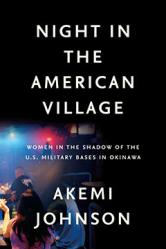AUTHOR SPOTLIGHT: Akemi Johnson
Akemi Johnson’s powerful account of the U.S. military bases’ effect on the small island of Okinawa, through the perspective of Okinawan women, is a wake-up call. The legacy of U.S.-Japanese history is alive and well, and Johnson’s book helps readers understand its complexities and nuances. Johnson’s Night in the American Village is a tender yet critical examination of the weighted and complex relationships between the women living near the U.S. military bases in Okinawa and the servicemen stationed there. Johnson explores the intersections of race, sex, power, and national identity by celebrating a fascinating variety of perspectives; she replaces clichés and stereotypes by building honest, complicated narratives of real Okinawan women.
Akemi Johnson is a Japanese American journalist and author. Her passion for Okinawa runs deep; she is a former Fulbright scholar in Okinawa and has written about the island in The Nation, Travel + Leisure, Explore Parts Unknown, and other publications.
Let’s start with your connection to this work. You first visited Okinawa as a college student in 2003, then you went back in 2008 to live there for a year. You’re also fourth-generation Japanese American on your mother’s side, and your father’s family has been in America since the 1600s when they fled religious persecution in Britain. What was your experience with writing about the relationship between Okinawa and the United States—a subject so close to home for you?
Actually, in Okinawa I was very much an outsider. My great-grandparents emigrated from Hiroshima, and, as I learned, there’s a great divide between mainland Japan and Okinawa. Okinawa—which was an independent kingdom until the late 1800s—has its own history, culture, and languages. I also felt on the outside of the U.S. military community in Okinawa, both figuratively and literally, with all the fences surrounding the bases that I couldn’t get past.
At the same time, I did feel a strong connection to the subject. As a biracial Japanese American, I recognized something in the story of Okinawa that felt familiar. I too have negotiated my identity in relation to Japan and the United States, and the legacy of World War II haunts my family, with memories of the mass incarceration of Japanese Americans. In the process of learning and writing about Okinawa, I felt like I was working out questions about my own history and identity as well.
The legacy and implications of World War II are often discussed in the context of the West—from the perspectives of the United States, Germany, England, and France. Or if we go east, the story is about Nagasaki and Hiroshima. Instead, your book takes us to an archipelago in Japan that most people wouldn’t name as part of World War II, but its story is really tied up in this war. Why Okinawa?
Certainly, for the tens of thousands of American soldiers who fought in the Battle of Okinawa, Okinawa is part of their World War II story. It was one of the bloodiest battles of the war in the Pacific, with significant casualties for both American and Japanese troops. But many might not know the story from the point of view of Okinawan civilians, who paid the highest price in the battle, with as much as a third of the population losing their lives.
This World War II story still resonates because it marked the beginning of the U.S. military presence in the islands, which continues today. Some Okinawans say they feel like the war never ended, because of the many U.S. military bases there and continuing issues like sexual violence, training and traffic accidents, unexploded ordnance, and noise and environmental pollution. The legacy of that war is what motivates many Okinawans to protest the U.S. military presence and call for the closure of bases.
You wrote that the tension between America’s claims of freedom and America’s oppression of people of color is present in Okinawa. How did you see these tensions play out when you were there?
In some ways, the American presence has been positive for Okinawans. The American occupiers granted women the right to vote in the aftermath of the war, and some present-day Okinawan women told me they preferred working on U.S. military bases. They said they enjoyed more freedom and less sexism on-base, compared to off-base work environments. They saw Japanese and Okinawan society as more restrictive for women, and chose to spend time in American spaces on the island, which they saw as more open and relaxed.
On the other hand, Okinawans have suffered because of the U.S. military presence. The United States occupied Okinawa for twenty-seven years following World War II, and during this time local people lacked rights. American military officials forced Okinawans from their homes to build bases, and hundreds of thousands were displaced. Poverty became widespread. Today, Okinawa remains the poorest prefecture in Japan, and the United States and Japan are building a new base against the will of the local population.
As one Okinawan anthropologist told me, in Okinawa, memories of U.S. oppression coexist with concepts of America as “the champion of democracy and freedom.” This contributes to the complex feelings many Okinawans have toward the U.S. military presence.
Can you speak to the relationship among sexual assault, violence, and the U.S. military presence in Okinawa?
There is a long history of U.S. military sexual violence, stretching back to the American invasion. During the U.S. occupation, American soldiers often faced no legal consequences for their crimes, and by many accounts, this was a time of widespread sexual assault. Okinawan villagers adopted a system of ringing a bell when they saw Americans approaching, and women would hide.
Today, there are more legal consequences, but the problem remains. It’s difficult to determine the exact extent of the issue, because most crimes go unreported. In Japan, only about 4 percent of rapes are reported to the police, compared to about a third in the United States. Some U.S. servicemembers have admitted that knowing these odds led them to commit sexual assault in Okinawa; they thought they could get away with it. There’s much work to be done both on- and off-base to address this issue.
Your book spends some time grappling with the term “amejo,” a derogatory term for women who want to date American men. You include a comment from a local American Okinawan man who described “amejo” as “the coolest,” explaining that in Japan, “you have to stay in your place. You have to be a good Japanese woman. For amejo to be so bold, that’s kind of badass.” Can you talk more about how these women are asserting their sexuality as a tool of resistance?
For some Okinawan women, dating American servicemen is a way to escape local society’s traditional gender roles. Japan may be an advanced nation in many ways, but it ranks 114th in gender equality. Many so-called “amejo” proudly wear what they want, date who they want, say what they want, do what they want. They don’t care how others see them. They’ve formed these identities in relation to the U.S. military presence, but ultimately, I don’t think it’s about the military or servicemen. The amejo subculture is about constructing an identity outside the confines of mainstream society.
Do you think there is any real reason for there to still be military bases in Okinawa now?
No, I don’t believe there is any real geostrategic need for so many bases on one small island. There certainly doesn’t need to be a new base, the one the United States and Japan are currently building in Henoko, against the wishes of the Okinawan people. In a recent referendum, 70 percent of voters in Okinawa opposed this new base, but American and Japanese leaders have ignored this mandate.
After spending time on the island, I do recognize that something would be lost with the closing of bases. For many people, they create vibrant, unique communities. But through democratic processes Okinawans have said they want a base reduction, and the United States and Japan should—finally—listen to and respect that.


